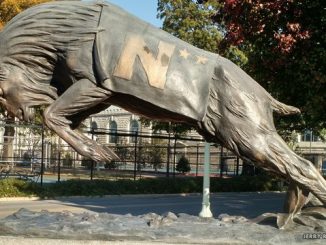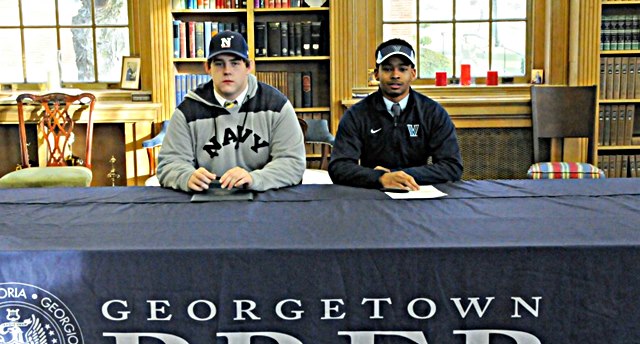
It’s easy to be a frustrated Navy fan today.
It’s easy to want to rip Ken Niumatalolo after his decisions on Saturday against Army.
It’s easy to be angry about the first-drive fumble, a play which carried as much impact as any other on Saturday… until the third-and-seven shovel pass which truly lifted Army from a place of peril on its game-winning drive.
It’s easy to come down hard on a Navy defense which continued to struggle on third downs — that includes third-and-long plays which didn’t get first downs but set up manageable fourth-down conversions. (The third-and-seven shovel pass was the most prominent example.)
It’s easy to look at coaching performances here, or player performances there, and utter the simple, reasonable words: “We really should have won that game against Army.”
There’s nothing wrong with saying that, just as there’s nothing wrong with feeling stung after a loss to West Point in Baltimore.
Feeling disappointed about the outcome of the latest Army-Navy Game is something which should belong to any Annapolis man or woman.
The key part of that sentence: about the outcome.
*
While being disappointed about the outcome of this latest clash with the Black Knights, Navy fans should not be disappointed with players or coaches.
Niumatalolo coached a deficient game against Army? No one would dare say or suggest that he was due for a game such as this, but just the same, Niumatalolo took this long to lose to West Point. He merely won his first EIGHT games against Army, putting him prominently in the pantheon of great Army-Navy Game coaches.
Navy finally committed the key turnovers and made the mental lapses on defense which turned a game against Army? Not every game during The Streak has been a work of art, but Navy’s ability to be the airtight team — the more responsible and cohesive team — in the fourth quarter FOR 14 STRAIGHT YEARS in this storied series is nothing short of remarkable.
Navy’s defense finally failed to make the key stop in the fourth quarter to keep Army at bay… and singing first at the end of an Army-Navy Game? How endlessly impressive it is that an Annapolis defense was able to be such a rock for nearly a decade and a half against the team Navy wants to defeat the most.
*
In December of 2001, Steve Spurrier was still coaching at Florida. UCLA was actually a good program. Nebraska still mattered. George O’Leary got caught for lying on his resume at Notre Dame.
In December of 2001, Miami was an elite football program, and no “The U” documentaries needed to be made about days gone by in South Florida.
Nick Saban hadn’t won a national championship. Jim Tressel was just beginning his Ohio State tenure. Urban Meyer was at Bowling Green in the Mid-American Conference.
In December of 2001, instant replay review did not yet exist. Keith Jackson still called national championship college football games and Rose Bowls. Purdue had a good program at the time.
Pete Carroll had just finished a 6-6 first season at USC, offering no indication that he would amount to anything as a college or pro coach.
It’s true that the Chicago Cubs’ 108-year World Series championship drought (or their 71-year National League pennant dry spell) and the city of Cleveland’s 52-year title drought represent overwhelmingly long periods of sports starvation. Compared to those skids, a 14-year streak doesn’t seem like much. Yet, considering the oceans of time which have swept past the planet since December of 2001, a 14-year streak still feels large — maybe not larger than life itself, but pretty darn close.
The Oklahoma football team won 47 straight games in the mid-1950s. USC won the Pac-10 championship seven straight seasons from 2002 through 2008, until a shaky 2009 season finally toppled Troy. The moments when these streaks ended were certainly painful. An inevitable “past-tense” realization creates a shudder or a wince or a cringe of longing.
Yet, accompanied by — or quickly following — the stab of pain comes the immediate awareness: “Man, those guys did something truly incredible. Will we ever live to see something comparable?”
14.
The number now lives forever in Annapolis as a testament and reminder of how great this era — Johnson, then Niumatalolo — has been.
The Midshipmen were beaten by a deserving Army side which earned its moment of long-awaited triumph. Yet, one can give Army and Jeff Monken (who outcoached Niumatalolo) all the credit in the world and still acknowledge the obvious: Had Will Worth and Toneo Gulley and Darryl Bonner not been injured, Navy would have stood a much better chance, to put it mildly.
Even though this game on Saturday marked the end of The Streak — the biggest in Army-Navy history — it doesn’t feel like the end of an era. Navy actually overachieved in this regular season in light of the Tago Smith injury on day one. A division championship in what was a ferocious and cutthroat AAC West — with Tom Herman and Philip Montgomery and Mike Norvell and Chad Morris all trying to get a piece of the Midshipmen — is one of the most luminous achievements Navy football has recorded since Roger Staubach took the field against Texas in the 1964 Cotton Bowl.
14.
Everyone in Annapolis wishes it could have been 15, but this is certainly a time to appreciate the magnificence and sustained consistency which made that number possible.
The end of a streak such as the one Navy enjoyed against West Point is certainly an occasion for frustration, but it’s just as much a time to relish — and appreciate — this remarkable run of excellence.
Navy coaches and players have a bowl game to play, but they’ll run through brick walls to ensure that a new streak (albeit not as long as 14) can begin in 2017.



